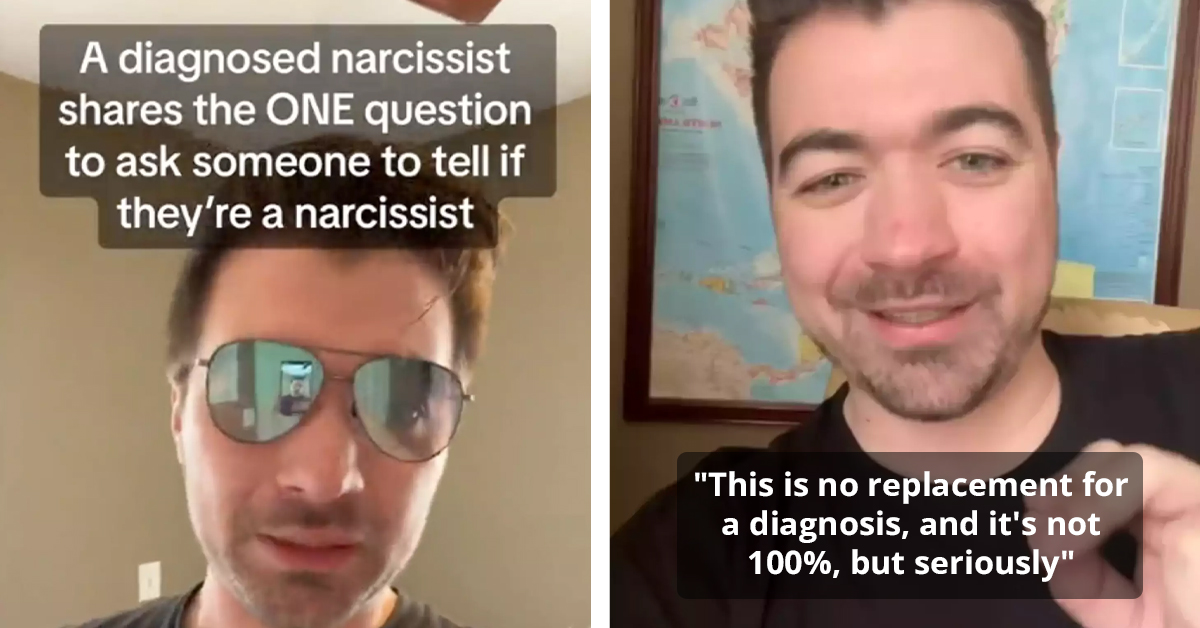
Diagnosed Narcissist Reveals The Key Question To Identify Narcissism In Others
When in doubt, don’t hesitate to ask.

Narcissistic Personality Disorder (NPD) is a mental health condition marked by an inflated sense of self-importance, a strong desire for admiration, and a notable lack of empathy for others. Individuals with NPD often struggle with fragile self-esteem and face challenges in their relationships due to their self-centered attitudes.
Recognizing this disorder can be complex, as it involves understanding subtle personality traits and behaviors. Jacob Skidmore, an Ohio-based content creator who goes by the name The Nameless Narcissist, has shared insights about living with NPD through his popular online platform.
With a following of over 200,000, Skidmore provides a window into the realities of this condition. He has openly discussed his experiences, including the fear and shame often associated with revealing one’s NPD diagnosis. Many individuals with NPD may hide their condition for years due to concerns about judgment and stigma.
Skidmore, who has become a voice for others with NPD, recently shared a thought-provoking question that can help identify someone with the condition. According to him, this question reveals whether a person views the world through the lens typical of narcissism.
The question is: "Don’t you think that there are just objectively better and worse people in the world, and people who are superior and inferior, and the rest of the world just wants to ignore that?"
This question encapsulates a fundamental belief of narcissists: the notion that some people are inherently superior to others. For those with NPD, this belief drives their behavior and interactions.
They often view themselves as part of an elite group, perceiving others as superior or inferior based on their self-worth. This distorted worldview significantly impacts their relationships and self-perception.
Jacob Skidmore has narcissistic personality disorder.
 TikTok
TikTokNarcissists are driven by a need to demonstrate their superiority, which stems from a deep-seated insecurity about their value.
They may continually seek validation and recognition to compensate for their inner doubts and fears. Skidmore's question highlights this perspective and can be a helpful tool for understanding whether someone holds such beliefs.
Jacob shared the critical question of determining if someone might have the same condition.
 TikTok
TikTokIt’s essential to approach this issue with sensitivity. Identifying narcissistic traits or NPD requires careful consideration, as these traits can be part of a broader spectrum of personality disorders.
While Skidmore’s question can provide insight, it is not a definitive diagnostic tool. A professional evaluation is essential for an accurate diagnosis and understanding of the full scope of the individual's condition.
"This is no replacement for a diagnosis, and it's not 100%, but seriously, I've never met a narcissist who didn't have the same reaction."
Narcissistic Personality Disorder is characterized by a set of complex behaviors and deep-seated beliefs about one's worth and superiority. Jacob Skidmore's analysis sheds light on the mindset of individuals with NPD, providing valuable insights into their thought processes.
Understanding these perspectives can help identify the disorder, but it's essential to handle the topic with sensitivity. A thorough grasp of NPD requires more than awareness; professional guidance is necessary to fully comprehend and address the nuances of this condition.
Approaching the subject with empathy and seeking expert advice ensures a more complete and compassionate understanding.
Damjan







